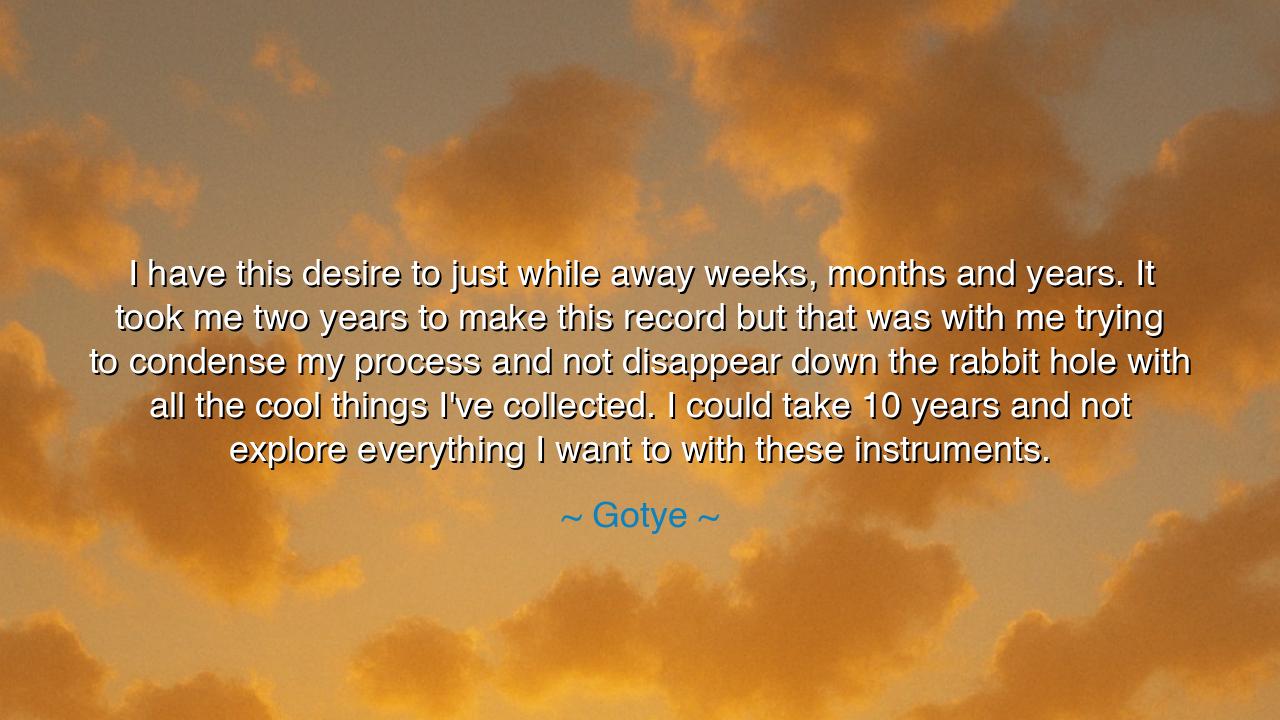
I have this desire to just while away weeks, months and years. It
I have this desire to just while away weeks, months and years. It took me two years to make this record but that was with me trying to condense my process and not disappear down the rabbit hole with all the cool things I've collected. I could take 10 years and not explore everything I want to with these instruments.






In the labyrinth of time and creativity, there exists a deep, eternal tension between action and reflection, between the desire to create and the allure of endlessly exploring the possibilities that lie within. The words of Gotye, “I have this desire to just while away weeks, months and years. It took me two years to make this record but that was with me trying to condense my process and not disappear down the rabbit hole with all the cool things I've collected. I could take 10 years and not explore everything I want to with these instruments,” speak to this paradox, this unquenchable thirst for both depth and completion. It is a desire to dive deeply into one’s art, to unearth every hidden treasure, yet knowing that the exploration can be endless—like a rabbit hole that stretches further and further, without clear boundaries.
This longing for deeper exploration, for taking time to discover every facet of one’s craft, is an ancient drive. The Greek philosophers believed that true wisdom came not from hurried action but from reflection and understanding. Socrates himself lived by the idea that one must constantly examine the self and the world around them, seeking knowledge at a pace that honors its complexity. But even Socrates understood the limits of this pursuit. He did not seek to know everything in the world, but rather to understand the nature of knowledge itself, to question and reflect on life’s deeper meanings. In this, Gotye’s desire to explore the depth of his instruments and the infinite creative possibilities they present mirrors that ancient quest for understanding—a desire to reflect and explore, even at the cost of completion.
In the same way, we see this tension between action and reflection in the journey of Leonardo da Vinci, who, throughout his life, amassed an incredible body of work. Yet, he was often unsatisfied with his creations, always striving to delve deeper, to improve, to discover more. His notebooks are filled with ideas and inventions that were never completed, much like Gotye’s creative process. Da Vinci’s obsession with perfection led him to spend years on projects, never fully satisfied with the results. He too, like Gotye, recognized the infinite possibilities in his craft and the difficulty of ever finishing what he started. For both men, the act of creation was less about completion and more about the endless pursuit of exploration.
This drive to explore without end is a testament to the human spirit’s restless desire for discovery. However, as Gotye reflects, this very restlessness can also paralyze, keeping one from ever truly finishing what they begin. The danger lies not in the desire for exploration, but in the inability to ever condense and complete the process. This, too, has been a theme throughout history. The Romans and their obsession with empire and expansion faced a similar challenge—each conquest was a new beginning, a furthering of the dream, but it also led to an endless cycle of growth that could never fully be satisfied. Like Gotye’s instruments, the Roman Empire, once vast, held an unquenchable hunger for expansion.
Gotye’s struggle to condense his process, to narrow his focus without losing the depth of exploration, is an experience that transcends art and music. It is a reflection of the human condition, the tension we all face between pursuing an infinite array of opportunities and bringing something to completion. In every endeavor, whether it is in art, business, or personal development, there exists the temptation to wander down countless rabbit holes, to follow every lead and idea, only to realize that we have left no room for the focus required to finish the journey.
The lesson here is profound: while the world is rich with infinite possibilities, true greatness is found in our ability to focus and commit to one course of action. Exploration is vital—it nurtures creativity and innovation—but it must be balanced with the discipline required to bring something into the world, to complete what we begin. Like Gotye, we must learn to condense our creative impulses, to acknowledge that the rabbit hole will always be there, but we must choose to take the next step and finish what we start. Just as the ancients found wisdom in understanding the limits of their pursuits, so too must we find balance in our own lives.
Thus, the journey is not one of endless wandering but of intentional discovery. As we face our own creative or personal quests, we must remind ourselves that while exploration is essential, completion brings meaning. Let us embrace






AAdministratorAdministrator
Welcome, honored guests. Please leave a comment, we will respond soon